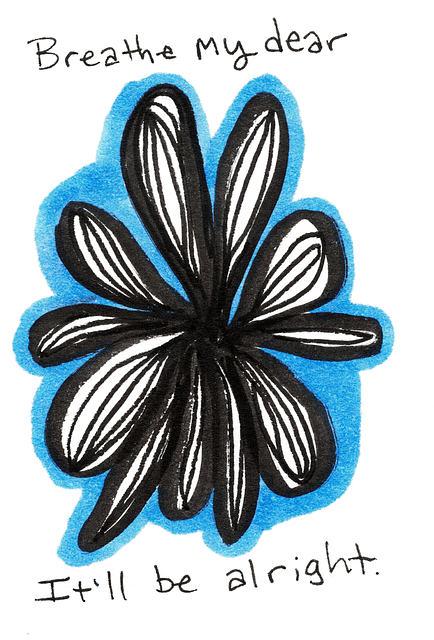Centennial Neuro Disorders Therapy (CNDT) tackles burnout among its healthcare providers, a pressing issue in high-stress medical environments. Through tailored strategies, CNDT promotes emotional healing with journaling and robust mental health policies, enhancing resilience. By identifying risk factors and early warning signs, they foster a supportive culture with open communication and team collaboration. Evidence-based practices, including Mind Over Matter principles, cognitive reframing, and mindfulness, are taught to manage stress. Prioritizing self-care and mental wellness through breaks, exercise, and hobbies creates an empowering environment, benefiting both providers' satisfaction and patients' outcomes at CNDT.
Healthcare provider burnout is a growing concern, especially in specialized fields like Centennial Neuro Disorders Therapy. This article explores comprehensive strategies to prevent and mitigate burnout among healthcare professionals. We delve into understanding burnout’s complexities from a therapy perspective, identifying risk factors and early signs, and proposing actionable solutions. From fostering a supportive work environment to adopting evidence-based practices and encouraging self-care, these strategies aim to enhance well-being and resilience in the face of demanding patient care.
- Understanding Burnout in Healthcare Providers: The Centennial Neuro Disorders Therapy Perspective
- Identifying Risk Factors and Early Warning Signs
- Creating a Supportive Work Environment
- Evidence-Based Strategies for Burnout Prevention
- Fostering Self-Care Practices among Healthcare Workers
Understanding Burnout in Healthcare Providers: The Centennial Neuro Disorders Therapy Perspective

Burnout among healthcare providers is a significant concern, particularly within specialized fields like Centennial Neuro Disorders Therapy. This therapy, focused on managing complex neuro disorders, demands immense emotional resilience and dedication from its practitioners. The relentless nature of patient care, coupled with high-stress environments, can lead to chronic fatigue, cynicism, and reduced professional efficacy—the hallmarks of burnout.
Centennial Neuro Disorders Therapy offers a unique perspective on mitigating these risks through tailored strategies. Encouraging providers to engage in emotional healing processes, such as mental wellness journaling exercises, promotes self-care and reflection. Moreover, advocating for robust mental health policy analysis and advocacy ensures that healthcare systems support rather than hinder provider well-being. These multifaceted approaches not only foster individual resilience but also contribute to a more sustainable and compassionate healthcare workforce.
Identifying Risk Factors and Early Warning Signs

Burnout among healthcare providers is a growing concern, but by identifying risk factors and early warning signs, we can implement effective prevention strategies. Centenal Neuro Disorders Therapy emphasizes the importance of proactive measures to safeguard mental wellness among its practitioners. Risk factors for burnout include excessive workload, lack of control over work processes, poorly defined roles, and an unsupportive work environment, all of which can be mitigated through thoughtful policy changes and organizational culture shifts.
Early warning signs are crucial indicators that should not be ignored. These may manifest as physical symptoms like chronic fatigue, headaches, or digestive issues, as well as emotional signs such as cynicism, detachment from patients, and reduced job satisfaction. Implementing stress reduction methods, including regular exercise, mindfulness practices, and access to mental health education programs designed for healthcare professionals, can help mitigate these early warning signs and foster a healthier work-life balance within the medical community.
Creating a Supportive Work Environment

In preventing burnout among healthcare providers at Centennial Neuro Disorders Therapy, fostering a supportive work environment is paramount. This involves creating a culture that prioritizes open communication and encourages team collaboration. Implementing conflict resolution techniques can help resolve disagreements constructively, minimizing tension and promoting a harmonious atmosphere. Additionally, empathy building strategies should be integrated into daily operations to enhance understanding and connection among colleagues.
Emotional intelligence plays a crucial role in cultivating this environment. Healthcare professionals equipped with strong emotional intelligence skills can better manage their emotions and understand those of others, fostering a supportive network. Through regular team-building activities, empathetic listening exercises, and continuous learning opportunities focused on these areas, Centennial Neuro Disorders Therapy can create an engaging, compassionate, and ultimately, less stressful work environment for its providers.
Evidence-Based Strategies for Burnout Prevention

In the face of escalating demands and a constant stream of challenges, healthcare providers are increasingly vulnerable to burnout. However, there are evidence-based strategies that offer a lifeline in this struggle. Burnout prevention strategies for healthcare providers must be multifaceted, encompassing both physical and mental health. This includes incorporating Mind Over Matter principles, which have been shown to significantly enhance emotional regulation – a key factor in managing stress and preventing burnout.
Centennial Neuro Disorders Therapy, for instance, emphasizes cognitive reframing and mindfulness techniques, empowering providers to navigate the complexities of their profession with resilience. By prioritizing self-care through regular practice of these strategies, healthcare professionals can foster a sense of balance and renewal. This proactive approach not only enhances job satisfaction but also improves patient outcomes by ensuring that care remains compassionate and effective.
Fostering Self-Care Practices among Healthcare Workers

In the high-pressure environment of healthcare, where professionals like those at Centennial Neuro Disorders Therapy constantly juggle life-or-death situations, fostering self-care practices among workers is paramount. It’s not just a recommendation but an essential strategy to combat burnout and preserve the quality of care. Healthcare providers, often so focused on their patients’ well-being, must also prioritize their own mental wellness through activities that recharge and rejuvenate. This can include dedicated breaks, exercise routines, hobbies outside of work, and access to resources like the Mental Wellness Podcast Series Production, which offers valuable insights and support for maintaining a healthy work-life balance.
By encouraging self-care, healthcare organizations can create an environment where professionals feel valued and empowered. Implementing stress management techniques, fostering open discussions around depression prevention, and promoting a culture of resilience are key steps in this process. These initiatives not only help individual providers but also contribute to a more sustainable and effective healthcare system as a whole.
Healthcare provider burnout is a growing concern, but with the right strategies, it can be prevented. By understanding the unique challenges faced by professionals in the field, such as those at the Centennial Neuro Disorders Therapy perspective, and identifying early warning signs, we can create supportive work environments. Implementing evidence-based practices like fostering self-care and promoting a culture of open communication are game changers. These strategies ensure healthcare workers feel valued, supported, and empowered, ultimately enhancing patient care and the overall well-being of the medical community.














